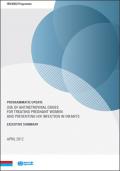Publications - Released in 2012
Recent developments suggest that substantial clinical and programmatic advantages can come from adopting a single, universal regimen both to treat HIV-infected pregnant women and to prevent mother-to-child transmission of HIV. This streamlining should maximize PMTCT programme performance through better alignment and linkages with antiretroviral therapy (ART) programmes at every level of service delivery. One of WHO’s two currently recommended PMTCT antiretroviral (ARV) programme options, Option B, takes this unified approach.
Now a new, third option (Option B+) proposes further evolution—not only providing the same triple ARV drugs to all HIV-infected pregnant women beginning in the antenatal clinic setting but also continuing this therapy for all of these women for life.
This programmatic update is meant to provide a current perspective for countries on the important changes and new considerations arising since publication of WHO’s PMTCT ARV guidelines, 2010 version, especially as a number of countries are now preparing to adopt Option B+. WHO has begun a comprehensive revision of all ARV guidelines, including guidance on ARVs for pregnant women, planned for release in early 2013.
Downloads
Organizations
- World Health Organization (WHO)






